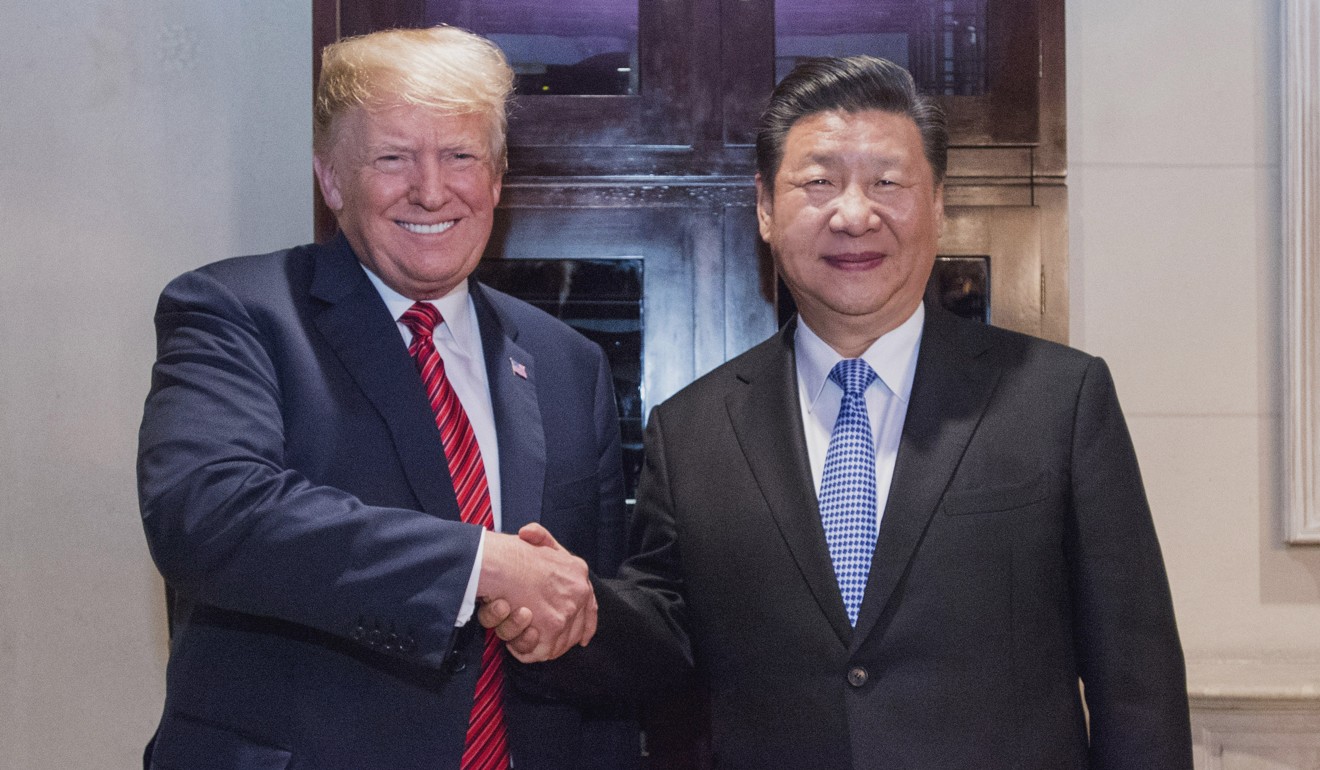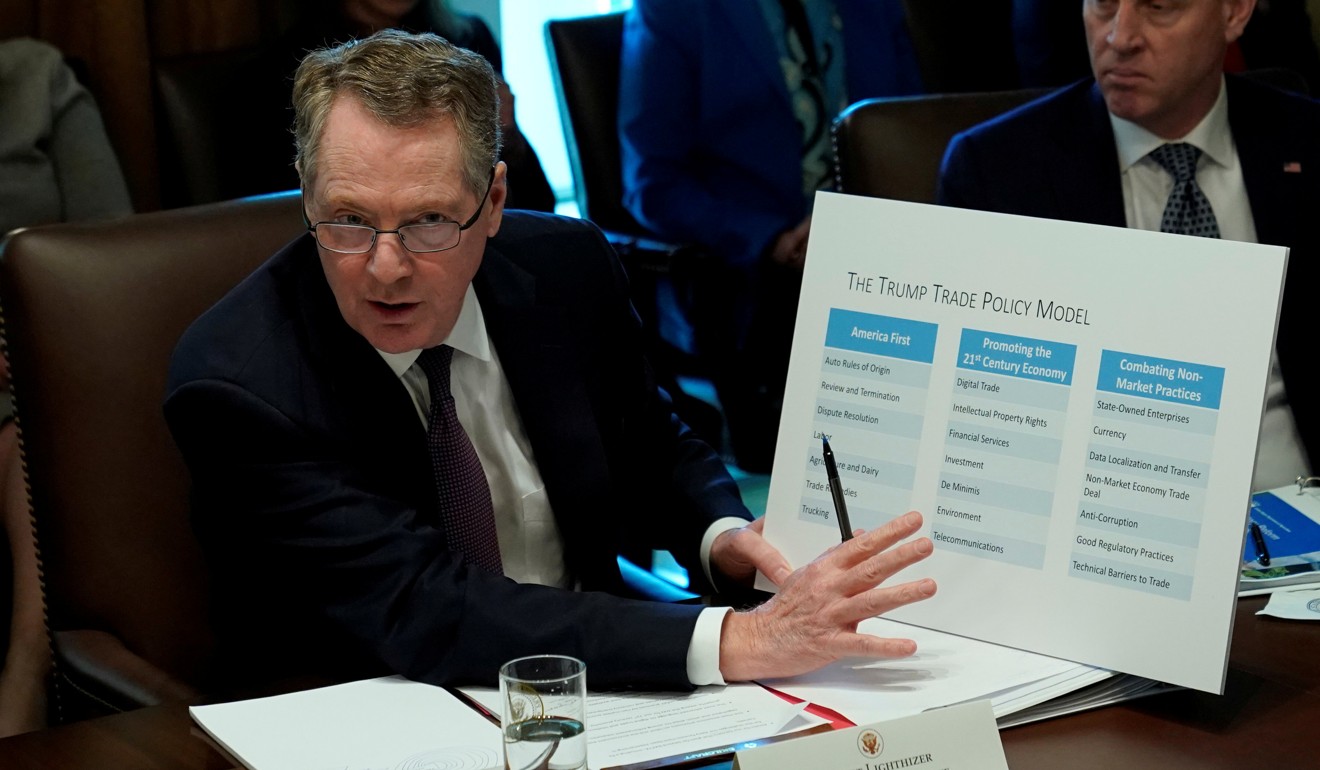
Trade talk movement as China agrees to slash tariffs on US auto imports from 40 to 15 per cent, report says
- Beijing takes first step in rejuvenated trade negotiations after the Trump-Xi dinner in Buenos Aires, according to the Wall Street Journal
- But a commitment to keep trade talks quarantined from other disputes is likely to be tested by other events
Beijing has agreed to lower import tariffs on US-made autos from 40 per cent to 15 per cent, the first measurable action to come out of the meeting between US President Donald Trump and China’s Xi Jinping on December 1, The Wall Street Journal reported on Tuesday.
The commitment was communicated in a call on Monday among Chinese vice-premier and designated lead trade negotiator Liu He, US Treasury Secretary Steven Mnuchin and US Trade Representative Robert Lighthizer, the Journal said, citing an unnamed source.
Opening up a new round of discussions aimed at bringing an end to the trade war, the call was described by China’s ministry of commerce as an exchange of views about a time frame and road map for “realising the consensus agreed upon at the summit of the countries’ leaders” after the recent G20 meeting in Argentina.
Reducing auto tariffs was not mentioned in official statements from Beijing after the dinner meeting in Buenos Aires, though Trump tweeted the next day that China had “agreed to reduce and remove tariffs on cars coming into China from the US”.
The Treasury Department and Office of the United States Trade Representative did not respond to requests for comment on Tuesday.
American auto exports to China fell sharply after tariffs were imposed in early July in retaliation for Trump’s 25 per cent tariffs on US$34 billion of Chinese imports.
The export value of vehicles in August stood at just over US$460 million, down 55 per cent on the same monthly figure for 2017, according to US census figures. The year-to-date value for 2018, around US$5.6 billion, was down just over 30 per cent compared with export numbers for 2017 through October.

Despite the notable impact of the tit-for-tat barrage of tariffs, a reduction in auto duties may be more symbolic than substantive, given that the Chinese market constitutes just under 11 per cent of all global exports of US motor vehicles, according to census figures for 2018 through October.
After a short-lived rebound in US auto stocks on Tuesday, stock prices for General Motors, Ford and Tesla all came back down at session’s close to an increase of less than 1 per cent.
It is “important to keep this in context: this removes a higher tariff imposed in retaliation for Trump’s tariffs, and brings the tariff level back down to where it would have been anyway,” said Patrick Chovanec, chief strategist at a New York-based investment advisory firm Silvercrest Asset Management, which manages more than US$20 billion in assets.
“In fact, China has been steadily cutting its tariffs on all imported cars, just not from the US, for several years. So China now charges the same tariff on US autos as it does on all other imported autos, which would already have been the case had Trump not initiated his own tariffs."
Tesla may have the most to gain from the pullback in tariffs. The maker of electric cars, which plans to open a factory in Shanghai next year, produces most of the cars exported to China in the US; General Motors and Ford already build most of their cars for the Chinese market in China.
Trump tweeted on Tuesday morning that there were “very productive conversations going on with China” and that “some important announcements” were to be expected.
In other signs that both sides remain optimistic about the progress of trade discussions, the Trump administration is holding off on the next payment of a US$12 billion subsidy package to US farmers affected by tariffs, according to Reuters, citing three people familiar with the matter.
Hopes that Beijing will resume imports of US soybeans at the beginning of 2019 prompted the delay, the sources said.
An increase in imports of US goods was one of the commitments to emerge from Trump and Xi’s dinner meeting, though, unlike an official statement from the White House that said China had “agreed to start purchasing agricultural products from our farmers immediately”, a Chinese foreign ministry readout of the summit did not mention agricultural goods specifically.
Progress on the trade front has come despite rising tensions over the arrest in Canada of Huawei chief financial officer Sabrina Meng Wanzhou, who was detained on December 1 at the request of the US, which wants to extradite her on charges of financial fraud.
The dispute between Beijing, Washington and Ottawa over Meng’s arrest reached new heights on Tuesday after reports that a former Canadian diplomat, Michael Kovrig, had been detained by Chinese authorities on unknown charges.
US and Chinese officials have taken steps to prevent the furore over Meng’s arrest from derailing trade talks, with Lighthizer saying on Saturday that it was “a criminal justice matter” that was “totally separate from anything I work on or anything that trade policy people in the administration work on”.
On Monday, a spokesman from China’s foreign ministry, which has frequently called on the US to act in “good faith” over the course of trade talks, insisted that Beijing hoped “both sides can work together to achieve the consensus reached between our two countries’ leaders”.

But a commitment to keep trade talks quarantined from other disputes may be further tested this week when multiple US agencies reportedly will announce measures to counter what they say are efforts by Beijing to steal trade secrets and hack government computer systems.
The moves, reported by The Washington Post on Tuesday, include indictments by the US Justice Department of a number of hackers over alleged attacks on US networks at the behest of a Chinese intelligence service.
Additional reporting by Jodi Xu Klein

